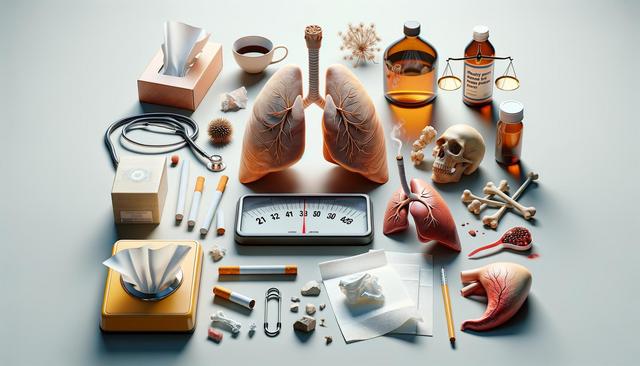Smoking and Tobacco Use: A Major Risk Factor
One of the most significant contributors to cancer risk is the use of tobacco products. Whether it’s smoking cigarettes, using cigars, or chewing tobacco, the carcinogens introduced into the body through these habits drastically increase the likelihood of developing various types of cancer. Lung cancer is the most commonly associated condition, but tobacco use is also linked to cancers of the mouth, throat, pancreas, bladder, and kidneys. Even secondhand smoke exposure can be dangerous, especially over long periods of time.
Some key signs to watch for if you are a regular tobacco user include:
- Persistent cough or hoarseness
- Unexplained weight loss
- Chronic respiratory infections
- Difficulty swallowing or persistent sore throat
Quitting tobacco use is one of the most impactful changes a person can make to reduce cancer risk. There are various cessation programs and support systems available to help individuals break this habit.
Poor Dietary Choices and Obesity
What you eat can play a crucial role in determining your cancer risk. Diets high in processed foods, red meats, and refined sugars have been linked to an increased risk of certain cancers, including colorectal, breast, and prostate cancers. Additionally, obesity itself is a known risk factor for multiple types of cancer. Excess weight can lead to chronic inflammation and hormonal imbalances that promote cancer cell growth.
High-risk dietary habits to be cautious of include:
- Consuming high amounts of saturated fats
- Regular intake of sugary beverages and snacks
- Low consumption of fruits, vegetables, and fiber
Maintaining a balanced diet rich in whole grains, lean proteins, and fresh produce not only supports overall health but also contributes to lowering the chances of cancer development. Making mindful eating choices is a proactive step toward long-term wellness.
Alcohol Consumption and Cancer Links
Regular or excessive alcohol intake has been associated with multiple forms of cancer, including liver, esophageal, breast, and throat cancers. Alcohol can act as a carcinogen by damaging body tissues and impairing the body’s ability to absorb essential nutrients. It also affects hormone levels, which can contribute to cancer risk, particularly in breast tissue.
Some signs that may suggest alcohol-related health issues include:
- Fatigue and liver discomfort
- Frequent indigestion or acid reflux
- Changes in skin or eye color (jaundice)
- Memory issues or mood fluctuations
Moderation is key when it comes to alcohol. For those with a family history of cancer or other risk factors, reducing or eliminating alcohol can be a wise preventive measure. Awareness of these associations is vital, especially for individuals with additional lifestyle-related risk factors.
Lack of Physical Activity and Sedentary Behavior
Leading a sedentary lifestyle can increase the risk of various cancers, including those of the colon, breast, and endometrium. Lack of movement affects hormone levels, metabolism, and immune function, all of which play a role in cancer development. Even individuals who maintain a healthy weight may be at risk if they are largely inactive.
Common behaviors that may contribute to this risk include:
- Spending hours daily sitting at a desk or in front of screens
- Rarely engaging in structured physical activity
- Using transport for even short distances instead of walking
Incorporating at least 150 minutes of moderate aerobic exercise per week, along with strength training, can significantly reduce cancer risk. Activities like walking, cycling, or yoga are accessible ways to stay active and improve overall health.
Ignoring Regular Health Screenings and Warning Signs
One of the most overlooked habits that can contribute to a higher cancer risk is neglecting routine health checkups and screenings. Early detection plays a critical role in successful treatment outcomes. When symptoms are ignored or brushed aside, it allows potential issues to progress undetected.
Warning signs that should not be ignored include:
- Unexplained weight loss or fatigue
- Changes in skin appearance or new growths
- Persistent pain or discomfort in specific areas
- Unusual bleeding or changes in bowel habits
Regular visits to a healthcare provider, along with age-appropriate cancer screenings, can lead to early diagnosis and intervention. Being proactive about health checkups, especially for those with family history or known risk factors, is a critical strategy in cancer prevention.
Conclusion: Awareness and Action Can Make a Difference
Recognizing and addressing these potentially harmful habits can significantly influence long-term health outcomes. While not every instance of these behaviors will result in cancer, they are associated with a heightened risk. Making conscious lifestyle changes—such as quitting tobacco, improving diet, staying active, moderating alcohol intake, and attending regular screenings—can play a vital role in prevention and early detection. Staying informed and proactive is essential for reducing cancer risk and promoting overall well-being.


